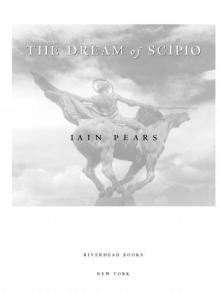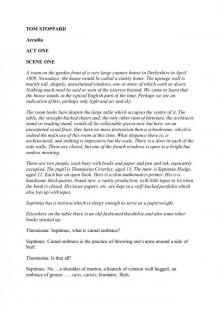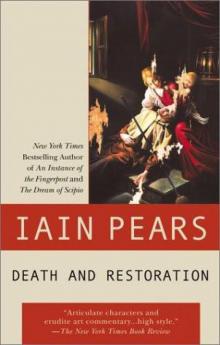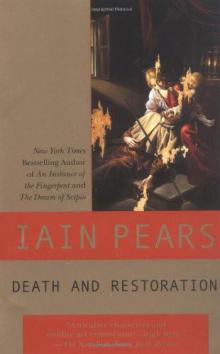- Home
- Iain Pears
Stone's Fall Page 26
Stone's Fall Read online
Page 26
By which time I was far away, threading my way through dark alleys and back streets down to the river. Then west, but not home; I dared not go there. Instead I went to Whiteley’s department store in Bayswater, bought a suitcase and some clothes (what a wonderful thing it is to have money), then to Waterloo Station and caught the 1:45 to Southampton. By this time I felt almost comfortable in my new role. I knew what I was doing, and why I was doing it, for the first time in weeks. I was also completely certain that I was not being followed, as the runner I’d paid to tag behind me signalled that all was well.
Having money and being preoccupied by a higher purpose did not mean I was immune to the pressures of the English class system, though. Merely being able to afford a first-class ticket does not entitle you to be in a first-class seat, or at least does not mean you will feel comfortable there. I endured it for half an hour, until we passed Woking, then I stood up and marched down to the scruffier, but altogther more comfortable, depths of second. The English Ruling Classes on holiday are terrifying, not least because they are not on holiday; they go to Cowes (and, I imagine, to Henley and Ascot) with the same steely determination that Grenadiers march into enemy fire. They are on display; they are working; the only work they do, in fact. Looking elegant, saying the right things, being with the right people is as vital for them as getting my punctuation correct is for me, or connecting up a pipe correctly is for a plumber; except that plumbers and journalists are more forgiving. One slip, and the Ruling Class are doomed, it seems.
No wonder they talked with such a nervous twitter; no wonder they spent much of their time nervously glancing at their reflection in the window as the drab suburbs of south London drifted past. A family of five; a mother, three daughters (two of marriageable age) and a son, who would have benefited from being put into old clothes and running around the streets throwing stones through windows. Poor child; he was so well behaved it was almost unendurable to be in the same compartment as him.
Now second-class was a very different thing, and I spotted two hacks from The Times, feet on the seats, in a compartment filled with smoke. I felt at home and safe and secure the moment I sat down beside them, even though (in the normal course of things) they were not my sort of journalist. Gumble was a war man, so I couldn’t really see what he was doing there. Jackson had been crime, but had vanished about six months ago. He seemed almost embarrassed to see me, and it took some time to discover why.
Eventually, after much questioning, he sighed, took out his notebook and handed it over for me to read.
“Whatever be her opinions as to its intrinsic joys, the woman who accepts a yachting invitation must see that she has dresses suitable for the occasion,” I read. I looked up at him, and he grimaced apologetically. “One of the new designs for Cowes is carried out in nattier blue marquisette over satin. Closely pleated in accordion fashion to give the narrow straight effect in a pleasing manner. An upturned collar of lace and tiny round-cut chemisette…”
“You poor fellow!” I exclaimed and he nodded gloomily. “What on earth did you do?”
“Missed the verdict in the Osborne murder,” he said. “Six months in fashion to teach me the error of my ways.”
I read on. “There was a day when serges were the only materials utilised for yachting dresses, but the weather during this week should make it possible to wear linens, tussores, shantungs and foulards…”
“I don’t even know what it means.”
“Nor do I,” he replied, taking back the notebook and stuffing it into his pocket once more. “It’s all in the dressmakers’ handouts. No idea what they’re on about at all.”
I turned to Gumble. “You’re not in the doghouse as well, are you?”
“Afraid so. I was in Afghanistan, doing really well, I thought.”
“But there isn’t a war in Afghanistan, is there?”
“There’s always a war in Afghanistan. Anyway, it’s a long story. If you think Jackson’s got troubles, what do you think of this?”
He also got out his notebook, and I again read. “Their Majesties’ dinner party included the Crown Prince and Crown Princess of Sweden, the Princess Victoria and Princess Victoria Patricia of Connaught, the Commander-in-Chief at Portsmouth, the Duchess of Teck and Elizabeth, Lady Ravenscliff. This morning they joined their yacht for Divine Service. The Service was conducted by Rear-Admiral Sir Colin Keppel A.D.C. In attendance were…”
“Bloody hell,” I said.
“I know. Two years dodging bullets in the Khyber Pass…”
“No. I mean Lady Ravenscliff.”
“Why are you interested in her? You’re right, of course. Her in mourning. She’s such a fixture, I suppose they couldn’t do without her. Don’t know what is happening to standards. But do I care? I do not.”
“You don’t happen to know where she will be in Cowes?”
“Is she going? Very inappropriate. She might well be a guest on the Victoria and Albert, of course.”
My heart sank. I thought that finding her would be simply a matter of going to her hotel and knocking on the door. But if she was half a mile out to sea, on the royal yacht, it was going to be more difficult than I had anticipated.
“Do you know,” he went on, “I think you’re the first person ever to be interested in this rubbish?”
I gave him back his notebook. I hadn’t realised she moved in such grand circles. Who would have thought it? “So you’re just going to the Isle of Wight to do this?”
“Ah! No. I hope to write something interesting about the Tsar. If I can only get something, then I win fame and favour. What about you? Didn’t I hear that you’d been fired?”
“I resigned. And I am going… In fact, that’s a bit complicated.”
“Where are you staying?”
I shrugged. “No idea. I thought I’d book into a hotel…”
They looked at each other, then laughed. “I hope you like sleeping on park benches then,” Jackson said, “if you can find one unoccupied.”
“I’d not thought of that.”
“You can bunk with us. We’re at the George. As long as you have no revolting personal habits…”
“None. And thanks.” “You’re welcome. You sleep on the floor and pay half the costs. We get the receipt.”
Fair enough. The Times was more generous than other papers over expenses. The rest of the journey was almost pleasant. I was given a swift grounding in Cowes Week by my two new companions—the only thing left out was anything to do with boats, as The Times that year had decided not to bother sending anyone who knew about racing. Too expensive. They even offered me work as a stringer to take care of some of them—the sixty-five-foot handicap or (better still) the King’s Cup. They didn’t suppose I wanted to try my hand at Mrs. Godfrey Baring’s bal masqué, did I? I declined the boats, never having been on one and not having the slightest idea how you would even tell who had won, but astonished them by accepting the ball. If Elizabeth was there, if she was still alive, it was the sort of thing she’d attend.
Cowes was crammed, and the Solent was like Piccadilly Circus on a busy Friday evening. The little ferry which took us and our luggage over from the mainland had to weave its way through hundreds of yachts—big and small, one-masted and three-masted, long and sleek and modern, old and rather run down—as well as what seemed like most of the Royal Navy lying a mile offshore for review. On shore it was even worse; the ferry was so full it looked as though it might sink at any moment, and we were hurled out onto dry land into a crowd of people—women with parasols, arm in arm, men in white ducks and blazers, holidaymakers in boaters, small children, nannies and servants. Jackson led the way to the George, a small hotel next to a printing shop, very expensive and less than luxurious. A small room with three people in it was, apparently, quite luxurious for the time of year and, even though we could scarcely all fit inside, we hoisted our bags onto the beds, then retired to the bar. Three pints of Osborne pale later, we felt quite recovered and ready for battle. I
had almost forgotten why I was there. I was no longer afraid. Not for the moment, anyway.
Jackson and Gumble at least knew what they were meant to be doing; Jackson positioned himself to take notes on what the likes of Mrs. Algernon Dunwether considered appropriate for her midafternoon wear—it seems that the wealthier women were obliged to change clothes up to six times a day, which was why houses close to the centre fetched such a premium—while Gumble wandered off to the offices of the Cowes Gazette to get the daily lineup of what those with titles would be up to all evening.
I, by contrast, was at a loss; I had vaguely imagined I would simply run into Lady Ravenscliff walking along the promenade, but clearly this was not going to be the case. So while I thought it over I strolled up the Esplanade to Egypt House, a large, modern pile of imitation Tudor brickwork that the Barings had taken for the week. This I stared at for a while, then looked out over the Solent to where the Victoria and Albert was anchored, then walked back into the town centre. I asked one of the boatmen from the royal yacht, but he hadn’t got a clue who was staying on the bloody ship and who was I to ask anyway.
Frustrating, although I found that a laziness slowly crept upon me even though there was enough on my mind to make me alert and nervous. I had only ever been to the seaside properly a couple of times, Sunday trips to Southend to waste time and money. Even there—not the most elegant of places—I discovered that the motion of the sea had a decided tendency to make me sleepy and stupid; it has always had that effect on me, and still does. Perhaps I had more in common with Ravenscliff than I realised. And the beer had an effect, of course, and by the time I got back to the George—not really very far—I was as dull as it was possible to be. I forced myself to keep on walking, as I knew that if I lay down I’d fall asleep for hours, and kept on going until I hit water again, an inlet which divides Cowes in two. There is no bridge, just a strange contraption which looks like a floating wooden shed that is pulled this way and that across the water by chains, ferrying passengers from one bank to the other.
I perched myself on a bollard, watching the people—girls and boys in sailor suits, men who worked in the boatyards, women coming over, some from grand houses, others more modest, after their shopping, going home to cook dinner, or have it cooked for them. And then I woke up with a start, and pulled my hat down over my head, hunched my shoulders to avoid being noticed by the man who had walked up the ramp and turned to stare back as the wooden gates—which looked as though they had been borrowed from a farmyard—swung shut.
It was him. There was no mistake, could be none; he was dressed differently, looking now like a bank clerk on holiday, in a dark suit and starched white collar. He had shaved, oiled his hair to look the part. But he still looked like a labourer, could never really pass as English. Still had the immobile features, the lack of expression in his eyes, which glanced around cautiously every moment, rather than staring ahead stupidly as I am sure mine had been until that moment. Jan the Builder took out a cigarette and lit it as the ferry floated off into midstream, but didn’t seem to notice anything strange about me.
I did my best not to look too attentive as the ferry stopped on the other side and all the passengers got off, to be replaced once more by new ones. Tried to keep my eyes on him as it came back over and at last I could get on board myself. But it was a waste of time. Ten minutes (and twopence) later, I reached the far bank and he had vanished. I walked quickly up the main road out of town, doubled back down side streets dotted with seaside villas of greater or lesser grandeur, turned left and right for more than an hour, but nothing. If the jolt in my chest when I saw him hadn’t been so extreme and painful, I would have concluded it had been a mistake. But it was not. I was sure it was not.
I have read many adventure stories in my time, and many of the problems in them seem to arise from the fact that the main protagonists never think of going straight off to confide in the police when they come upon some dastardly deed. Instead, they keep their information to themselves, and all sorts of trouble results. Of course they always manfully sort everything out in the end; but often I wonder how much easier it would all have been had the authorities been kept properly informed in advance.
Besides, I had no desire to sort it all out myself, manfully or not. So I went back to town and straight to the police station. And there I realised why the strapping heroes of fiction do not spend their precious time on such activities. The authorities, on the whole, are not interested. Had I been reporting a stray dog, or the theft of an umbrella, or the loss of a pocket book, then I have no doubt that Constable Armstrong would have snapped into action as quickly as you like. Instead, he looked at me as though I was the problem, sucked his teeth thoughtfully, and frowned in a manner which suggested very strongly that he considered me to be someone who needed humouring.
“I suppose even anarchists must have holidays,” he said in a jocular fashion. “Must be hard work, all that overthrowing, and all.”
“This is not a joke.”
“Very well. Tell me what’s bothering you.”
And so I did, but by the time the policeman had realised that I had only heard at secondhand that Jan the Builder was an anarchist revolutionary; didn’t know his real name; only heard at secondhand that he had a gun; didn’t know for certain he had one on him; only saw him at a considerable distance; had only seen him once before; and couldn’t swear that he wasn’t on holiday, he began to lose patience.
“We’re not going to get martial law declared on the basis of that, are we, sir?” he commented.
I scowled, and stumped out.
CHAPTER 28
“What on earth do you think you’re doing dressed up like that?” Jackson asked.
I looked aggrieved. It was past eight o’clock, I hadn’t eaten, and I was almost ready to go.
“You asked me to do this ball, didn’t you?”
He stared at me, then burst out laughing. “You’re meant to report on it. Not go to it, you idiot. You don’t seriously think they’ll let you in, do you? You’re supposed to stand by the gate and get a list of the guests as they arrive. Not trip the light fantastic with the Duchess of Devonshire.”
“Oh.”
I looked at myself in the mirror. I had been rather proud of my appearance. I was dressed as a fisherman, having rapidly bribed an old man in the port to let me have his oilskins and hat. To this, I had attached lots of flies and bits and bobs of the sort that fishermen use, so I thought. And I had a large wicker basket with a plaster lobster in it which I’d bought from a shop which sold tourist trinkets.
“Besides,” Jackson said scornfully, “it’s a bal masqué, not a fancy-dress party.”
I stared at him; I think he heard me deflating. “There’s a difference?”
“This sort of ball, the men dress as usual. The women wear masks. That’s why it’s called a masked ball.”
“I have to go,” I said. “Even if I have to break in. I have to find Lady Ravenscliff.”
“Why?”
“She’s… It doesn’t matter. I need to find her.”
“I doubt you’ll find her at a ball. She’s meant to be in mourning.”
“She dined with the King.”
“That’s different. That is allowed, just. But a ball? It would be a scandal. It’s bad enough that she came here at all. If she did.”
“I mean, if everyone’s masked… She’s the sort who would slip in. Someone there will know where she is. I’ve got to go. Just in case.”
“Not as the representative of The Times, you’re not. It’s more than my job’s worth.”
I must have been looking properly desperate, because he dropped the scornful jocular tone and looked at me shrewdly. “You’re about the same size as Gumble. Take his clothes, then.”
“Won’t he need them?”
“Yes.”
He opened the wardrobe door and started pulling out clothes. “You’d better hurry. He’ll be very annoyed when he finds out.”
So an
hour later, as the evening was just tipping over into darkness, I was walking up Egypt Hill, a road that led away from the promenade and skirted the gardens of the Baring house. I had thought of trying to talk my way in, but gave up the idea; journalists can do much—get into courtrooms, police stations, people’s houses—by sheer brass neck, but gatecrashing a society party, I thought, might need practise. So, drawing on the wisdom of George Short once more—never be direct if you can be devious—I kept an eye on the wall until I came across a place with a suitable tree that had branches hanging down across the stonework. Half a minute later I was in the garden, adjusting my bow tie, dusting down Gumble’s suit and walking, more boldly than I felt, up to the house itself.
Nobody gave me a moment’s attention. It worked perfectly; I was given a glass of champagne by a passing waiter, and strolled into the main reception room—already full of people and heady with the smell of perfume—where I leaned against a wall and watched to get my bearings and work out precisely how I should behave. Remember: such an event was as foreign to me as an Esquimaux wedding party; I needed to tread carefully. And I felt ridiculous. Evening dress was not my normal wear; I’d been more comfortable in the fisherman’s oilskin. The fact that most of the women were far more ridiculous-looking than I could ever dream of being was no consolation. Why they ever consented to such absurdities, how it was considered the height of fashion, eluded me. Had they possessed the stylishness of Elizabeth Ravenscliff, they might have succeeded. But most looked like plump middle-aged Englishwomen in masks. Not for the first time, I was glad that I lived in the world of pubs and press rooms. Besides, how did society operate? Was it permissible just to go up to someone and start talking? Would I cause a scandal if I engaged some young girl in conversation?

 The Dream of Scipio
The Dream of Scipio Stone's Fall
Stone's Fall The Last Judgement
The Last Judgement An Instance of the Fingerpost
An Instance of the Fingerpost The Bernini Bust
The Bernini Bust Arcadia
Arcadia Death and Restoration
Death and Restoration The Raphael Affair
The Raphael Affair The Titian Committee
The Titian Committee The Immaculate Deception
The Immaculate Deception Giotto's hand
Giotto's hand The Portrait
The Portrait The Bernini Bust ja-3
The Bernini Bust ja-3 Death & Restoration ja-6
Death & Restoration ja-6 The Immaculate Deception ja-7
The Immaculate Deception ja-7